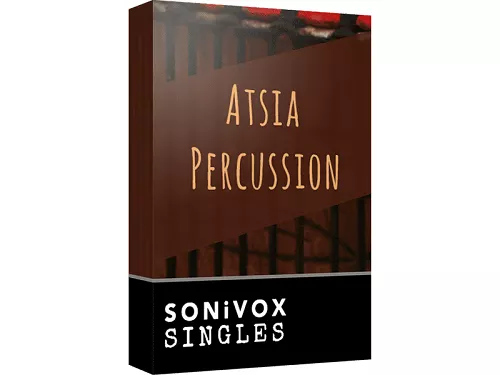SONiVOX Singles Atsia Percussion v1.0.0.2022 [WIN]
This collection includes the Dunumba, Kenkeni, and Sangban (all from Ewe tribe of Ghana), Gungon (from the Dagomba of Northern Ghana), and Macana Surdo (from Brazil). All are cylindrical, double headed drums, though they are otherwise built quite differently and create a variety of sound. They are typically used for foundation rhythms. Up to 4 velocity levels, with both open and closed (muted) hits.
Atsia Bells
An essential component in African percussion ensembles, these bells provide an important structure to the rhythms. Instruments include Iron Castenet, Kenken, and Toke, and the all important Gankoqui Bells. Gankogui is the foundation of the entire ensemble. Its voice provides the metronomic background around which most Anlo-Ewe music is structured. 5 separate Gankoqui bells have been included. Up to 4 velocities and both open and muted strikes, give a wide variety of timbres.
Atsia Floor DrumsHand Hit
This set of drums includes the Djembe (one of the most popular hand drums around the world in drum circles, rituals, and gatherings), Apentema, and three differenrt Kpanlogo drums – conga shaped drums covered with antelope skin. Both strong hand and weak hand hits have been sampled. Open and muted hits and open and muted slaps of up to four velocities, give you a wide range of percussive sounds to work with.
Atsia Floor Drums Hand & Stick Hit
This set of drums is played with both hands and sticks and includes the Atsimevu, Boba, and Sogo. The Atsimevu is the lead drum and most important performer in the Ewe ensemble. The function of the Atsimevu is to lead the rest of the group through a performance. The performer utilizes a variety of strokes to produce a rhythmic language communicating with the rest of the ensemble. The Sogo is the second most important drum in the ensemble next to the Atsimevu and is the largest of the supporting drums. The Boba is a large barrel shaped drum that produces a thunderous, booming bass sound for the ensemble. Up to 4 veloceties, with a wide variety of open and muted stick hits, slaps, stokes, and double hits give you a wide ranging percussive “vocabulary” with which to create your music.
Atsia Floor DrumsStick Hit
The floor drums in this set of instruments function in both lead and supporting roles. All are played with sticks. Instruments include: Kaganu, Kidi, Kloboto, Kpegisu, and Totodzi. Kpegisu is one of the oldest living oral traditions of West Africa, and is deeply expressive in its use of allegory and metaphor. Formerly a dance for those going off to war, Kpegisu is now performed on special occasions. The Kpegisu drum is named after this dance. Both strong hand and weak hand hits have been sampled. Open and muted hits plus side stick are included, with up to four velocities.
Atsia Frame Drums
The Gome and Tamalin are two unique frame drums from the Ashanti and Ga peoples of Ghana. The Gome is like a small table with a rectangular or square shaped skin table top. When placed on its side on the ground, the drummer sits on it, playing it with the hands and the heels of the feet, which press against the skin to change pitch. The Tamalin is square or rectangular shapedand is held with one hand in the middle of the cross-shaped frame and struck with the other hand. A wedge tuning system and goatskin head produce a high steady tone. Up to 4 velocities of center and edge hits, mutes, and slaps.
Atsia Shakers & Snaps
Shakers add color and texture to a percussion ensemble. These shakers are from Ghana and Brazil and include Afoxe, 4 different Axatse, 2 different Caxixi, Frogs Eggs, Ganza, Maracas, and Shekere. Finger Snaps are also included. Multiple velocities, single shakes, double shakes, and taps.
Atsia Talking Drums
Shakers add color and texture to a percussion ensemble. These shakers are from Ghana and Brazil and include Afoxe, 4 different Axatse, 2 different Caxixi, Frogs Eggs, Ganza, Maracas, and Shekere. Finger Snaps are also included. Multiple velocities, single shakes, double shakes, and taps.

